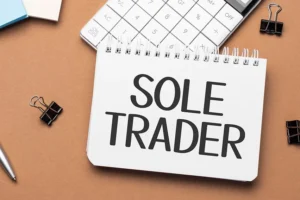Which is the best one
When you start out in business you will have the opportunity to decide how you will set-up your business. There are quite a few different structures for companies. I am only going to talk about the main 3 that you may have heard of and are generally the 3 you will be thinking about. They are a Sole Trader, Partnership, and a Limited Company. The others are generally more specialised and geared to specific circumstances.

Sole Trader:
This is normally the 1st step, where you may be in business just by yourself.
For example, you might be a plumber who only does bathroom installations and general household plumbing repairs. You could register the company in your name but trade as something else. For example: I registered my business as Neil Stewart, Sole Trader. However, I call myself Bathrooms and Repairs. My actual official title would be Neil Stewart Trading as Bathrooms and Repairs. On my Van I would just have Bathrooms and Repairs printed on the side. My paperwork would show, Bathrooms and Repairs from Neil Stewart. Essentially you can trade as whoever you like as long as the whole name is unique. Neil Stewart Trading as Wimpey Homes is unique. Now Wimpey Homes will probably not like it so they may ask me to stop trading as Wimpey Homes.
Income:
As a Sole Trader your income from the business you run is reported to the taxman, HMRC, on your personal tax returns. You will have to submit a personal tax return every year declaring what you have sold, your costs and expenses, etc. This then determines how much tax you will have to pay. * A tip here is to put 25% of all your sales aside, maybe in a separate bank account, to make sure you have enough to pay the tax bill.
25% is more than you will need, 25% will keep you in a good place and you can always use the leftover surplus after paying your tax bill to celebrate the year.
In the UK HMRC is trying to get every business to go digital with their returns. Where some businesses will have submitted paper returns each year they want you to use software for your bookkeeping, invoices, bills, etc and their the software will hook up to the HMRC to submit the returns.
Responsibility:
As a Sole Trader, if your company should get into trouble financially then the rules are that all your possessions can be forced to be sold to pay back your creditors, the people you owe the money to.
Let’s say that you are fitting bathrooms and you had an amazing 3 months. You fitted a bathroom every week for 12 weeks. You ordered on your account with the local bathroom supplier all 12 of these bathrooms. The account gives you a 90 day credit. That means you have 90 days to pay the supplier for items they have delivered to you.
This would give you ample time to fit, invoice, and pay the supplier
Now something like the pandemic has just hit and all the people you fitted bathrooms for have lost their jobs and can’t pay for the work you have done. This puts you in a position where you can’t pay your supplier back. I am assuming here that you have no saved money that you can use to cover the debits. The Supplier has decided to take you to court for the money you owe them and the court rules in their favour. You still don’t have the money to pay them so they can now force you to sell your house to pay them back or your expensive possessions like cars, expensive watches, etc.
Worst of all though you will now have a CCJ (county court Judgement) and winding up or bankruptcy notice against you personally. This will impact you in the future should you want to borrow money, take out a credit card, or buy anything with a payment plan.
That said if you manage your business finances correctly you will never get into this situation. There are lots of things you can do to make sure you do get paid. The simplicity of a Sole Trader is also very appealing.

Limited Company:
A limited company has a structure and official documents to it.
You will have a director and shareholders.
If it’s just you in the company then you could be the 100% shareholder and the Company director. There are certain rules that you must follow and have official documents in place. Normally you would engage an Accountant to help you with all this set-up. You must submit a full set of accounts each year and pay any Corporation tax due. There are good advantages to having the Limited Company, Limited liability (covered below). You can have more shareholders which may help with future inheritance tax. There are certain tax advantages.
Now I am not a tax expert so you would need to get a qualified and great advisor.
Responsibility:
Now if you set-up as a limited company this means your liabilities are limited to what the company has or owns. In the scenario I just mentioned above, where you have 3 amazing months work and no one paid you, then when the supplier decides to take your company to court for what you owe, the debit can only be recovered from the company’s assets. If the company has no assets, for example, doesn’t own the building it works from or cars/vans they use are leased, etc then all that they can recover is what’s in the company bank account and anything else the company owes. The company may have computers, office furniture, etc. these can all be taken and sold.
Having a Limited company protects your personal possessions in this scenario. Your home is safe! As long as you didn’t knowingly run up bad debt or behave illegally the debt stays with the company. If you did act illegally and kept ordering supplies knowing you couldn’t pay for them then your personal possessions would be at risk.
Income:
All your income and costs are put through the company and you must submit a full set of accounts each year to HMRC. This could mean more costs as you will probably engage an accountant who will charge you to create the accounts return and submit it for you. If you work for the company then you may have a wage or be paid in dividends. Your wage will need to be recorded on your own personal tax return. So we have created an extra set of returns each year. Again there will be a calculation to show how much corporation tax you should pay for the year. Depending on your business there are more allowances that may help you reduce the tax bill to less than you were paying as a Sole Trader. You can also become VAT registered which again depends on your accountants advice
 Partnership:
Partnership:
A partnership is effectively where you have multiple sole traders deciding to work together. All the same, rules apply as a Sole Trader only you are working with someone else. You could have business partners in a limited company but distributing Shares to each person accordingly.
One thing that is very important here is whichever way you go, partnership or limited company shareholders and directors, YOU MUST HAVE A PARTNERSHIP agreement in place. To protect yourself and the other partners. There are templates available on line that could be a starting point. Just Google it.
I hope this has been a useful insight into company structures that might be right for you.
If you want any more information or help please feel free to book in a 10 -15 minute chat with me at this link:
https://calendly.com/neilstewarttraining/10-min-call
Best Regards
Neil Stewart


